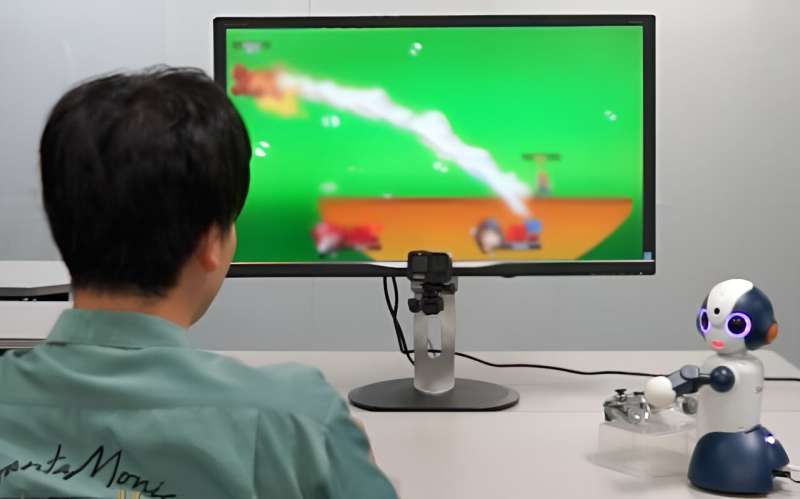
In recent years, engineers have developed a wide range of robotic systems that could soon assist humans with various everyday tasks. Rather than assisting with chores or other manual jobs, some of these robots could merely act as companions, helping older adults or individuals with different disabilities to practice skills that typically entail interacting with another human.
Researchers at Nara Institute of Science and Technology in Japan recently developed a new robot that can play video games with a human user. This robot, introduced in a paper presented at the 11th International Conference on Human-Agent Interaction, can play games with users while communicating with them.
"We have been developing robots that can chat while watching TV together, and interaction technology that creates empathy, in order to realize a partner robot that can live together with people in their daily life," Masayuki Kanbara, one of the researchers who carried out the study, told Tech Xplore. "In this paper, we developed a robot that plays TV games together to provide opportunities for people to interact with the robot in their daily lives."
The new robotic system created by Kanbara and his colleagues is based on a dialogue system that supports smooth conversations with human users. This system processes what users say while playing games with the robot and produces suitable responses.
The researchers also developed a system that adapts the content of the game that a human user and robot and playing, for instance by changing the game characters and what they are doing. As the game progresses, the robot can say things that are aligned with what is happening at the time, while retaining a friendly tone.
"The proposed robot dialogues with a human while playing a competitive TV game together to realize a continuous interaction between the human and the robot in daily life," Kanbara explained. "The robot is happy when it wins and frustrated when it loses."
To assess the potential of their proposed robotic system, Kanbara and his colleagues tested it in an experiment involving 30 human participants. These participants were asked to play the same videogame alone and in conjunction with the team's robot, then share their feedback in a simple questionnaire.
In this questionnaire, most participants said that they found playing with the robot more enjoyable than playing alone. This highlights the promise of the team's companion robot for entertaining users and improving their gaming experience.
"In recent years, some have been exploring the potential of TV games as tools to help the elderly to practice their mental skills and remain sharp," Kanbara said. "Therefore, our robot can be used as one of the functions to continue to use partner robots that watch over and support the lives of the elderly."
The robot developed by this team of researchers could soon be improved further and tested in additional experimental trials, to further explore its potential. In addition, this recent study could inspire the development of other interactive, instructive and robot-assisted gaming experiences targeted toward specific segments of the population, such as older adults or children diagnosed with autism spectrum disorder (ASD).
"The evaluation in this paper showed the effectiveness of the proposed robot during a short game time of about 15 minutes," Kanbara added. "In the future, we aim to design a robot behavior that continues to motivate interaction over a long period of time, in terms of months or years."
More information: Shogo Kanda et al, Robot to Play Video Games Together, International Conference on Human-Agent Interaction (2023). DOI: 10.1145/3623809.3623832.
© 2024 Science X Network
Citation: A robot that can play video games with humans (2024, January 9) retrieved 9 January 2024 from https://techxplore.com/news/2024-01-robot-play-video-games-humans.html
This document is subject to copyright. Apart from any fair dealing for the purpose of private study or research, no part may be reproduced without the written permission. The content is provided for information purposes only.
